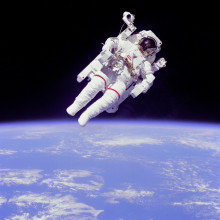Explode or Freeze first in Space?
Naked Physicist Dave Ansell tries to recreate Space in his garden, in order to get to grips with a listeners question.....
In this episode

00:00 - Would you explode, or freeze, in space?
Would you explode, or freeze, in space?
Hannah - In the vacuum of space where it's a low pressure, water boils at a lower temperature. It expands, creating gas and this could possibly cause you to explode or if you're sitting in the Earth's orbit, you'll eventually end up at about 4 degrees Celsius in the sun. If you're in-between galaxies however, with no stars or hot sun around you, you'll end up about minus 270 degrees Celsius. So, let's firstly do an experiment to find out what would happen to our blood in space. I visited Dave Ansell, putting a glass of water as a substitute for blood into a pressure chamber to recreate the low pressure in space. Dave - So, we're now at about a quarter of atmospheric pressure and you can see small bubbles starting to form.
Hannah - The vacuum chamber is actually misting up with all of the water that's evaporating from the tumbler and water is then condensing on the cooling tubes. Wow! There's just been an explosion, I think.
Dave - Biggish bubble coming up which has sprayed water. So, this is what would happen if you had a glass of blood in space. It would boil, but a human isn't a glass of blood. Your blood is surrounded by blood vessels and tissue, so whether that means the blood will boil is another question.
Hannah - So, how can we test that? I'm not putting myself in a vacuum chamber.
Dave - As a better model of a person being in space to a vacuum, I have a nice succulent oven ready pigeon. I've now put that in the vacuum chamber.
Hannah - Oh! I can see the skin popping. There seems to be like kind of air bubbles coming out of the skin.
Dave - So, the skin is actually being lifted slightly by water vapour, and other gases trapped underneath it and they're expanding as the pressure outside it is reducing and it's lifting some of the skin off. That might rupture some blood vessels near the surface, but the skin itself is one solid piece. It's not really exploding.
Hannah - A pigeon isn't a perfect model for a human as it's been mostly bled and has had its head cut-off, and skin damaged by plucking. But these results do seem to suggest that our circulation and tissue can, to a large degree withstand the low pressure of space. Dave also adds.
Dave - Various experiments have been done on this deliberately and less deliberately. Various animals have been exposed to vacuum and they don't explode, they have various tissue damage, and possibly our eardrums will get damaged if the depressurisation is very quick. But their body's plenty strong enough to contain that pressure. And in fact, even a person has been accidentally exposed to a vacuum and he survived the experience.
Hannah - So, we'd probably asphyxiate and dry out rather than explode and I'll be having a slightly desiccated roast pigeon for my supper this evening I think.
- Previous The Last Organism Alive on Earth
- Next Wildfires




Comments
Add a comment